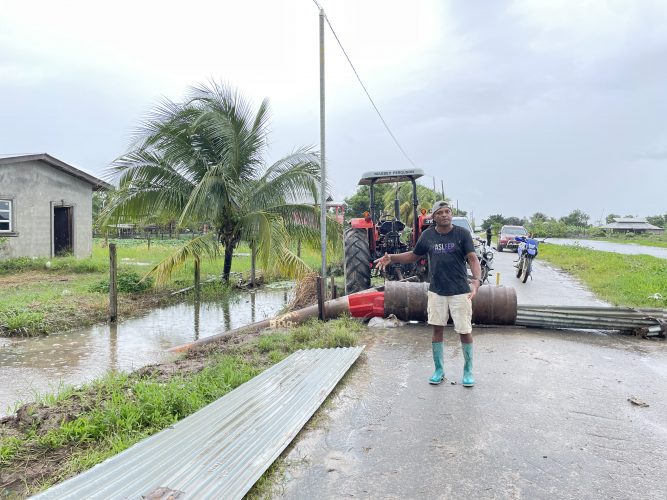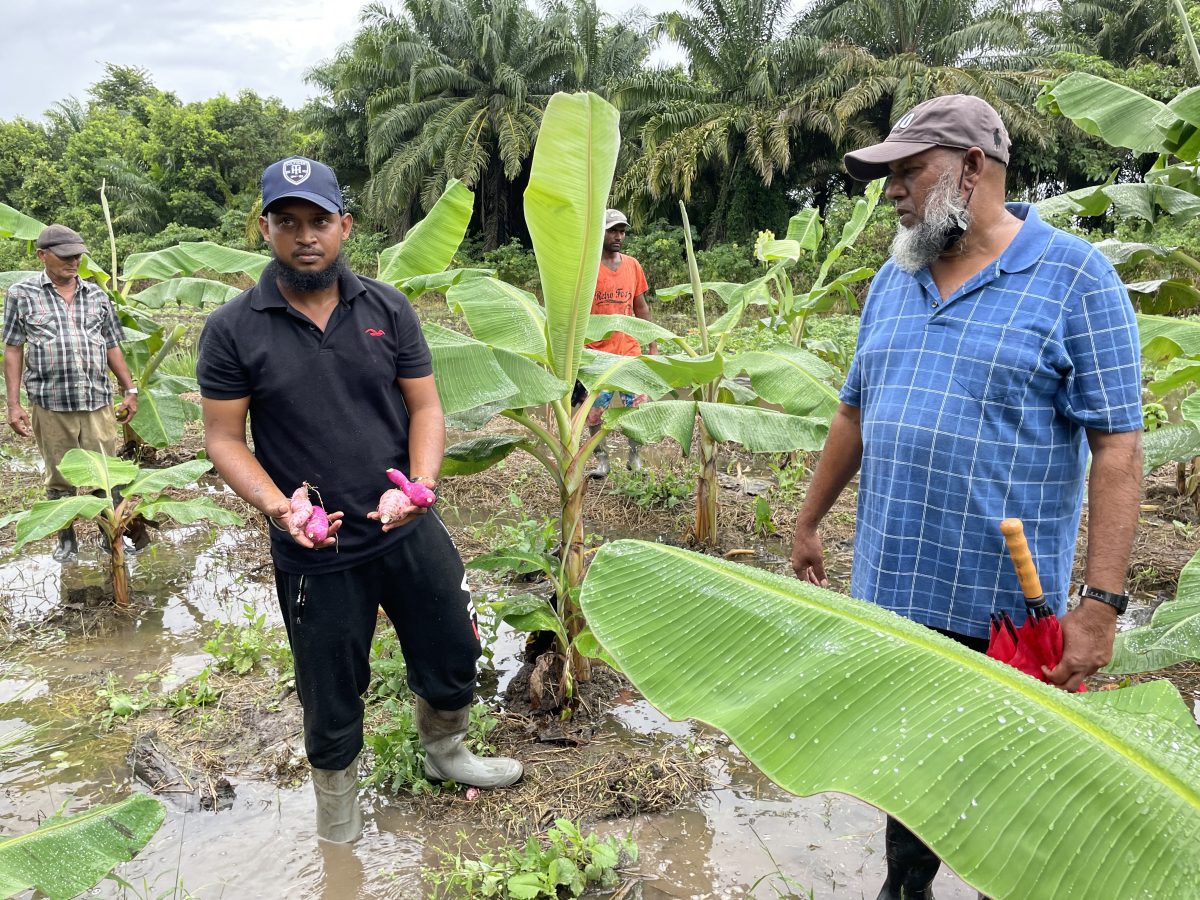At the Hague Backdam, on the West Coast of Demerara yesterday, a distressed large-scale provision farmer, Chunilall Hansraj, was using a tractor pump in a desperate bid to get water out of his crop.
He cultivates 20 acres of farmland in three different locations and one of his four workers, was also digging temporary drains to get the water out of his sweet potato, plantain and cassava cultivation.
He was among several farmers whose crops are all under threats owing to the flooding caused by excessive rainfall, which is expected to continue for a few weeks.
He told the Sunday Stabroek that he started pumping out the water on Friday afternoon and had already spent more than $75,000 in fuel.
He suffered about $3 million in losses during the last flood a few months ago but only received $100,000 in flood relief.
The farmers expressed frustration with the drainage system and are calling on the government to install a pump to bring some relief to them.
The farmers took this newspaper to their farms, via road up to a point and because of the deplorable conditions, we had to continue by boat.
They said promises made to construct an all-weather road were never fulfilled. They called on government officials, especially Minister of Agriculture, Zulfikar Mustapha, to visit the area to address that and their other concerns.
The frustrated farmers were very vocal about the losses they have suffered and said it is negligence on the part of the National Drainage and Irrigation Authority (NDIA) workers, who are responsible for maintaining the drainage.

Basdeo Sookdeo, a rice and cash crop farmer, said the water was so high that it was pouring over the dam into his rice field.
He farms 20 acres of rice land and 26 acres of ground provision.
When this newspaper caught up with him, he was in the trench with two of his workers. Asked what he was doing there, he responded that he had put some of his seed paddy to soak in the trench and that the water was so high that he could not find all of them.
He was angry that the nearby villages of Windsor Forest and Den Amstel have pumps at the kokers and that even though Hague has so much farm land under cultivation, the authorities did not see it fit to place one at the koker there as well.
He said that could have assisted the farmers in draining their land faster. “Only one night of heavy rainfall caused all of this damage. If they put a pump at the koker it would relieve some of the burden of the water. If they do that it can actually control the water,” he lamented.
Sookdeo alleged that the Water Users Association (WUA) was not functioning properly because the drainage is not being properly maintained. He said, too, that the rangers need to send someone to close the koker when the heavy rain starts so the severe flooding can be avoided.
Poor management
When contacted last evening, a regional representative from the Ministry of Agriculture told this newspaper that the maintenance of the main drains falls under the responsibility of the Den Amstel/Fellowship WUA but it is having difficulties sourcing labourers.
He admitted that the flooding is as a result of the poor management of the WUA. He said, “They have an excavator just going round and round cleaning the channels whereas there was supposed to be manual maintenance… We will have to move the same excavator to Hague to try to assist.”
The representative pointed out, too, that all of the drainage channels were cleared during the last rainy period.
With regards to having a pump in the area, he said there would be issues. He, however, added that if the drains are cleared, the koker could adequately drain the floodwater.
Farmers showed this newspaper the conservancy that supplies water from Leonora to Hague, Den Amstel and up to Vreed-en-Hoop and said that with the heavy rainfall and the height of the water NDIA should close the koker at Leonora.
They also complained that some faulty work was done on the koker and that they had to take actions themselves to try to rectify it.
Krishna, who has a two-acre pine farm with about 20,000 head of pine and another six acres of cassava and sweet potatoes, is also counting his losses.
He said that on Friday the water was much higher on the land and he placed some tubes to drain it. He was also preparing to pump it out yesterday but noticed that it had receded a little. If the rain continues he would lose the crop.
Another farmer, Deochand ‘Dino’ Gangadin, who farms 20 acres in different locations, said one plot was severely affected by the flooding.
When this newspaper visited, he was busy at the back of the land trying to clear a pipe that has to take out the water. He said that instead of the water receding it was rising.
Down the drain
Another farmer, Shameer Ali told Sunday Stabroek that his sweet potatoes, cassava and plantain crops on his four-acre farm were all under water.
He said if the rainfall continues he would not be able to save anything. To make matters worse, he had only recently recovered from the last flood, for which he received $50,000 in relief fund.
He pointed out that he had lost all of his crops, including seven huge “bearing” avocado trees and that the amount received did not even match the loss he suffered.
His son, Ameer, who manages the farm, had invested in a quantity of drugs only a few days ago, to spray the crops. He also bought about 10 bags of fertiliser, which has increased from $5,000 per bag to $9,000.
When Ameer visited the farm around 10 am on Friday, with a workman, he was devastated when he saw that his hard labour and investment had gone “down the drain.” Ameer pointed to some of his plantain trees that had been affected by the last flood and said they had not even gotten a chance to clean it up to replant and the floods came again.
They had replanted in some sections though and he was afraid that he would lose them as well if the water remains on the land for a prolonged period.
He said that before the last flood they reaped one bunch of plantains weighing about 50 to 60 pounds but those that survived the flood only weighed about 15 pounds.
Ameer also pulled out some sweet potatoes that were submerged. He said they would have been ready to reap in a month’s time but would become rotten if the water does not recede.
Bissoondial, a rice and vegetable farmer, said his rice field, as well as his plantain, banana, eddo and vegetable farm, including Boulanger, poi bhagi, ochro plots were flooded.
He said too that he planted his seed paddy since last Sunday and was distressed that it had not germinated “and the rain continuing.” He suffered losses during that last flood but has not received any flood relief.
“When you carry losses like this it breaks your heart to know that you have so much investment,” Bissoondial said.
Gaindalall Chotu suffered losses to his crop of vegetable and fruit trees. During the last flood he lost 800 roots of passion fruit, coconut plants and sucker plants. He was afraid that all of his crops would be lost again.
He also assists his son-in-law with his 14-acre rice crop that is two weeks old. He has been pumping water off the land in an effort to save the crop.
An elderly couple, Majeed and Rymoon, said their fruit farm at the back of their yard was flooded and they were afraid that the trees would eventually die.






